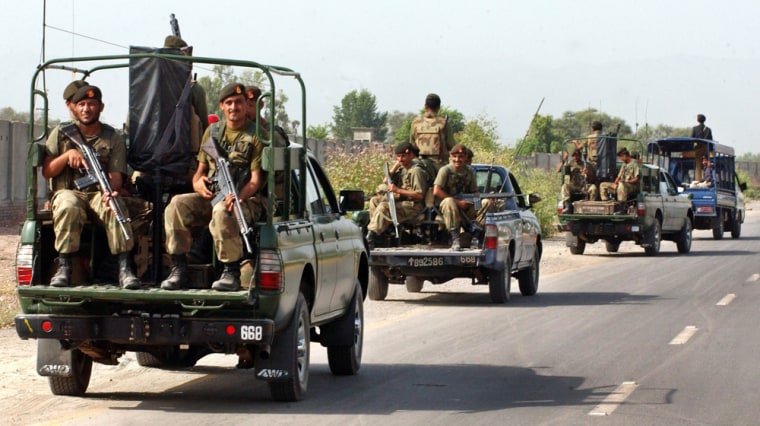Pakistani forces bombarded suspected militant hideouts with mortar shells Saturday as the government launched a major offensive against Taliban fighters threatening the main city in the country's volatile northwest, officials said.
The offensive in the Khyber tribal region marked the first major military action Pakistan's newly elected government has taken against the militants operating in the tribal areas along the border with Afghanistan.
The government had said it preferred to try to defuse tension with the groups through negotiations, but with threats by Islamic militants to the city of Peshawar growing in recent weeks, the military decided to take action.
Khyber also is a key route for moving U.S. military supplies into neighboring Afghanistan.
By Saturday afternoon, the paramilitary Frontier Corps began shelling suspected militant hideouts in the mountains in Khyber.
"We have occupied, captured all important heights, and we have taken control of the area," said Maj. Gen. Alam Khattak, the Frontier Corps' head. He said his troops destroyed three militant centers and killed a gunman. The operation was expected to last up to a week.
Talks suspended
In response to the operation and other recent confrontations with security forces, Baitullah Mehsud, the Taliban leader in Pakistan, said he was suspending talks between his allies and the government. He implied his forces could cause trouble in Pakistan's main cities.
"Peace cannot be brought with force and aggression. This will be very unfortunate for the Pakistani nation if fighting starts again," he told The Associated Press by telephone.
Fasih Ullah, a police officer in Khyber, said 700 Frontier Corps troops moved into Khyber late Friday for the operation.
A round-the-clock curfew was imposed in the Bara area bordering Peshawar, and heavy contingents of troops blocked the main road into Khyber, said Mujeeb Khan, a senior local official.
A top official with a local law enforcement agency called the Frontier Constabulary said his forces had brought in reinforcements and heavy weapons to protect Peshawar and its more than 1 million residents from insurgents who might try a counterattack.
"We have increased our strength we will not let any militant come this way," Tauseef Haider said from the constabulary's brick outpost in Shahkas, on the edge of the tribal area just outside of Peshawar.
Complicated situation
Across from the outpost was an expanse of flatland covered in bushes and foliage in front of undulating hills that turned into mountains.
In a sign of expected resistance, a Taliban-linked group said an offensive in the area will only create more problems.
"If the government thinks there is any issue to address, that should be resolved through talks, not by the use of force," said Munsif Khan, spokesman for the Vice and Virtue Movement. "We are ready for talks with the government."
Vice and Virtue, led by Haji Namdar, is suspected of carrying out operations against coalition soldiers across the border in Afghanistan. Namdar has sought to impose his own strict brand of Islamic law in the region. He is at odds with Mehsud.
Menghal Bagh's fighters have waged attacks in Peshawar in what provincial officials say was an attempt to intimidate the population and show the group's ability to wield influence outside the tribal regions.
Bagh's followers have also been blamed for threatening convoys of supplies bound for coalition forces in Afghanistan.
Headquarters razed
In the first hours of the operation, authorities blew up Menghal Bagh's headquarters, and he fled to the remote Tirah Valley along the Afghan border, an intelligence official said, speaking on condition of anonymity because he was not authorized to speak to the media.
Mahmood Shah, a former security chief in Pakistan's tribal regions, said the Taliban control the country's entire tribal belt and "everyone now is waiting for some action from the federal government."
"They are on our doorstep," Shah said. "The situation is like water flowing into a field and until you have some obstruction to stop it you will drown. We are drowning."
Two weeks ago, a Taliban force from Khyber sent its militants into Peshawar and kidnapped 16 Christians who were later released.
Misrri Khan, who works for a tribal paramilitary force that patrols Khyber, said the militants kidnapped 16 of his fellow officers and threatened to behead them — and then take more captives — if they did not abandon their checkpoints in the area. Khan said the force refused.
Security 'fragile'
The Pakistani offensive comes as the Pentagon reports that security is "fragile" in many parts of Afghanistan. "The Taliban regrouped after its fall from power and have coalesced into a resilient insurgency," states the report, which was released Friday.
Though coalition forces have had some success fighting the Taliban, terrorist attacks and bombings are likely to continue and even escalate this year, the report concludes.
February elections brought a new civilian government to power, eclipsing former army strongman and U.S. ally President Pervez Musharraf. In a shift in policy, the new administration has supported peace efforts with Taliban militants to try to curb an explosion in violence in the northwest over the past year.
But Pakistan's Western allies are increasingly concerned that easing up military pressure on the militants has given them more space to operate — letting them strengthen their position in Pakistan's border regions and giving them more freedom to attack U.S. and NATO forces in Afghanistan.
Prime Minister Yousuf Raza Gilani was in Peshawar on Saturday on a trip he said was unrelated to any impending operation.
At meetings in Peshawar on Friday, federal and provincial representatives hammered out the details of the Khyber operation. They also discussed the situation in the restive Swat area, where the provincial government has signed a peace deal with a radical pro-Taliban cleric, provincial officials said.
Afrasiab Khattak, chief negotiator for the provincial government, told the AP that the province is considering a second military operation in Swat, where militants forced out by an army offensive last year are now regaining a foothold.
